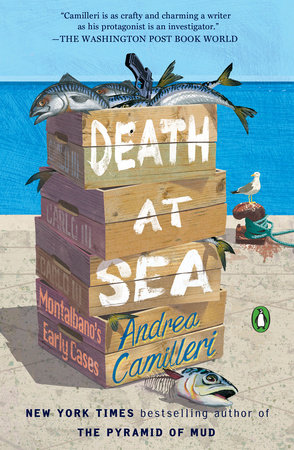ceoln (e)k Andrea Camilleri(r)en Death at Sea liburuaren kritika egin du
It was... okay?
3 izar
I feel as though I ought to have enjoyed these little police mysteries more, given how famous and well-regarded the author and the character are.
I read the first story and half of the second a while back, but bogged down and put it aside. Today I picked it up again, more determined, and read from the beginning of the second story all the way through. It wasn't bad?
These are simple crime mysteries with a homey feel; one is clearly supposed to like Inspector Montalbano and his setting: the general feel of small-city Sicily, the housekeeper who cooks so well, the young girlfriend from Genoa whom the housekeeper dislikes, the various foods and drinks that are so often and lovingly mentioned, the colleague that knows the history of every attractive woman in town, the eccentric unreliable secretary or something at the station who talks in a barely comprehensible accent …
I feel as though I ought to have enjoyed these little police mysteries more, given how famous and well-regarded the author and the character are.
I read the first story and half of the second a while back, but bogged down and put it aside. Today I picked it up again, more determined, and read from the beginning of the second story all the way through. It wasn't bad?
These are simple crime mysteries with a homey feel; one is clearly supposed to like Inspector Montalbano and his setting: the general feel of small-city Sicily, the housekeeper who cooks so well, the young girlfriend from Genoa whom the housekeeper dislikes, the various foods and drinks that are so often and lovingly mentioned, the colleague that knows the history of every attractive woman in town, the eccentric unreliable secretary or something at the station who talks in a barely comprehensible accent that draws one to think about how a translator translates something like a thick regional accent.
(In this translation, Catarella has lines like "Chief, 'ere'd be a soitain Signor Valletta onna premisses wantin' a talk t'yiz poissonally in poisson," and one is extremely curious what that was in Italian and what it signified.)
The crimes, even when the Mafia is involved, are relatively mundane, even when horrifying. The solutions are sometimes completely unremarkable, sometimes aided by the equivalent of a fortunate shower thought by the Inspector, sometimes involving a little casual law breaking or letting the guilty go free in the interests of a wider justice. Which is all fine. Montalbano sometimes feels like a slightly-too-perfect possible self-insert, but not painfully. I guess it's somewhat comforting and heartwarming overall?
But I don't know. Maybe I'm just getting old and jaded, but I didn't come away feeling like it had all been a particularly good use of time in the reading. Maybe if I read more of them I'll come to know better and be fonder of this world, and more eager to just hang out and be comfortable in it?
Maybe we'll see. :)

